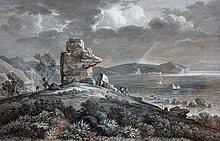Palinuro
Palinuro ( Greek Παλίνουρος ) is a figure from Roman mythology . Palinuro is the reliable and prudent helmsman of Aeneas on his odyssey from the destroyed Troy to Italy .
In the fifth book of the Aeneid , Aeneas is already close to his goal, Venus , mother of Aeneas , turns to the sea god Neptune to ask him for a safe journey for her son. Neptune reassures them that only one man from the crew of Aeneas would be harmed at sea, a sacrifice for many. A little later it turns out that it is Palinuro: Somnus , the sleep god, lies down on him, and despite initial resistance, he can lower him to sleep. Asleep, Palinuro falls from the ship.
Aeneas (and with him the reader) learns of his further fate on the descent into the underworld in the sixth book, where he sees him again among the unburied: Palinuro drifted across the sea on the carried oar for three days and ended up stranded on the coast of Lucania . As soon as he thought he had been saved, he was killed by the residents of the area. The Sibyl promises him that a neighboring people will bury him and establish a cult for him.
According to ancient sources, the Cape Palinuro promontory in the Cilento is named after him.
literature
- Immic: Palinuro . In: Wilhelm Heinrich Roscher (Hrsg.): Detailed lexicon of Greek and Roman mythology . Volume 3.1, Leipzig 1902, Col. 1295-1300 ( digitized version ).
- Carl Koch: Palinurus 2. In: Paulys Realencyclopädie der classischen Antiquity Science (RE). Volume XVIII, 3, Stuttgart 1949, Sp. 149-151.
- Fulvio Canciani: Palinouros . In: Lexicon Iconographicum Mythologiae Classicae (LIMC). Volume VII, Zurich / Munich 1994, p. 151.
- Hans-Jost Frey : Palinuro . The inexperience of the end , in: Aleida Assmann (ed.): Texts and Lectures. Perspektiven in der Literaturwissenschaft, Frankfurt 1996, pp. 67–78.
